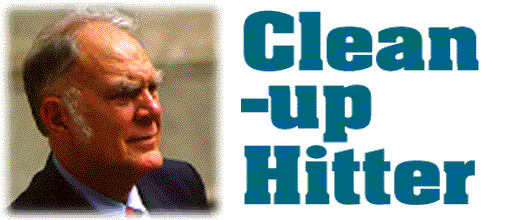

(Continued from previous page)
Sherry Rowland, as he is known toeveryone, was born in Delaware, Ohio, where his father was a professorand chair of mathematics at Ohio Wesleyan University. The younger Rowlandentered Ohio Wesleyan at age 16, and because there were but 30 or 40 civilianmales on campus, he says, he was able to make both the varsity baseballand basketball teams. After graduation came military service. Then, ashad been foreordained by his family, he would continue his education. Hisparents had firm convictions that the University of Chicago, which eachhad attended, "was not just the best choice for graduate work, butthe only choice."
"I just applied to Chicago," Rowland recalls,"and I went off, not knowing the name of anyone who was on the facultyor having talked with anyone who was there." His randomly assignedmentor was Libby, whom he credits with teaching him almost everything helearned about how to be a research scientist.
But not all of Rowland's time was spent in the lab. "Ireally ran around with the jocks on campus," he says. "I wasplaying over at the gym and found out I was eligible for the Universitybasketball team. And then they started talking about baseball, and I endedup being the first baseman and clean-up batter for three years." In1950 he played for and managed the Oshawa Merchants a championship semiproteam in Canada. How did all this sit with Libby? "He thought I waslazy, and with respect to chemistry that was probably true," Rowlandadmits. "I led a busy life." He and Joan were married on campusin what is now the Thorndike Hilton Chapel on June 7, 1952. They had twochildren; today their daughter, Ingrid, is an associate professor of arthistory at the U of C.
After a stint doing postdoctoral research at PrincetonUniversity, Rowland joined the faculty at the University of Kansas, wherehe rose steadily through the professorial ranks. In 1964 he went to thebrand-new Irvine campus of the University of California as its chemistrydepartment's founding chair.
Rowland followed advice from Libby: to deliberately strikeout in a new research direction every few years. Yet he has remained interestedin the chemistry of
the atmosphere--and in environmental challenges. He is very concerned aboutglobal-warming scenarios caused by man-made carbon dioxide emissions. Andhis research team recently discovered that common liquid propane gas--thecooking and heating fuel leaking from millions of tanks that dot low-incomeneighborhoods around the world--is a critical component of urban smog.
The 70-year-old Rowland is currently foreign secretaryof the National Academy of Sciences, and he has served as president andchair of the American Association for the Advancement of Science. His adviceto young scientists who may be hard-pressed to discover something new ina crowded field: "Don't look under the light. Go out into the darkness."
For those of you keeping score at home, here's the wrap-up:Rowland recognized a problem where everyone else saw only blue sky, andlife itself hung in the balance. A global effort mobilized by his predictionshas, in his words, "put a cap on what goes into the atmosphere."And, even though he admits that "it's very hard, essentially impossible,to get back out of the atmosphere that which has already gotten into it,"the good news is that Rowland's work may have spared the planet far graverdamage.
How does that make him feel?
"Well that's as you can imagine," Sherry Rowlandreplies. "One would not have thought it possible for anyone to havedone it, and to have been involved in doing it oneself is chastening andeye-opening and, I'd say, an area of satisfaction."
Spoken like a true champion.
Go to:
- INVESTIGATIONS
- CHICAGO JOURNAL
- LETTERS
- CHICAGOPHILE
- Feature story: "Clean-uphitter"
- Feature story: "Wavingthe Chicago flag"
- Feature story: "Betweentwo Worlds"
- Feature story: "Bloomin review"
- CLASS NEWS, includingALUMNI AWARDS
- DEATHS
- BOOKS BY ALUMNI
- IN THE CLUBS
Return to August 1997 Tableof Contents